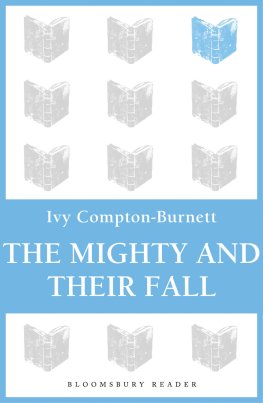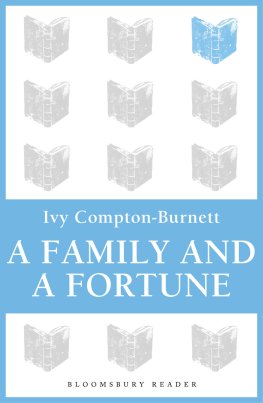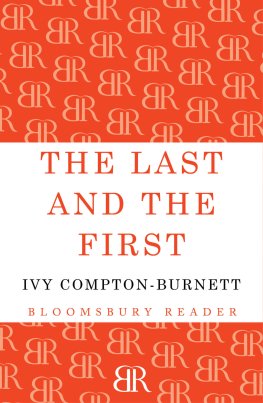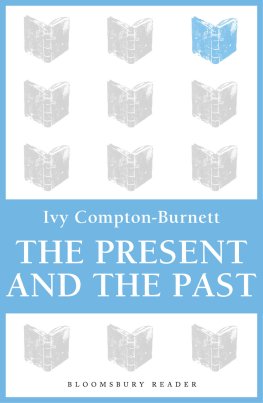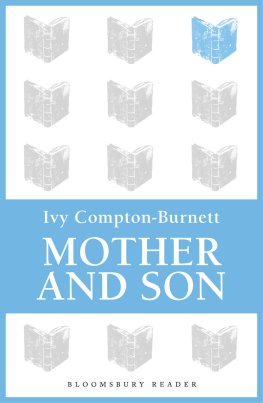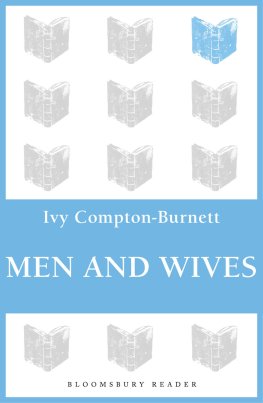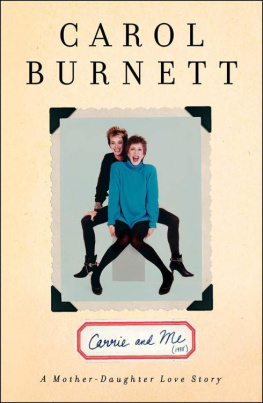Ivy Compton-Burnett
The Mighty and Their Fall
Agnes first, Hengist second, Leah third! said Lavinia Middleton, as her sisters and brother contested the access to the cloakroom in the hall. And dont be too long. Miss Starkie is waiting for you.
She told us to stay in the garden.
Only for half-an-hour. How long have you been?
Only three-quarters, said Hengist, as if this was a reasonable difference.
And we are to have the dining-room luncheon. So we dont have to go upstairs.
Well, one of you should tell Miss Starkie, said their sister, leaning back on the hall bench.
I dont want to, because I am the boy, said Hengist. It is not a real reason.
No one could want to for any reason, said Leah.
Miss Starkie may not want to wait for her luncheon, said Agnes.
She ought not to mind, said Hengist. She should be thinking of higher things.
Nothing could be higher than food, said Leah. Perhaps it is too high for her.
They broke into mirth and continued their talk, a short, sturdy pair of eleven and ten, with broad, sallow faces, dark, deep-set eyes and an almost saturnine aspect. Something about them, when together, suggested the sympathy between them. Agnes was a mild-looking girl of fourteen, with blue eyes, narrower features and a placid but resolute expression.
What is the jest? said their elder brother, coming up to his sister on the bench.
Miss Starkie. Something about her thinking of food.
I used to be surprised that she did. It seemed to reduce her to our level.
Or to raise her to it, said Leah. Food is on the heights.
Well, I feel just about on a line with it at the moment, said Miss Starkies voice. So I have come down to pursue it, as no one came up to me. I suppose you are to have your share downstairs today.
We were just going to tell you, said Agnes.
I have had to take the will for the deed. It is already later than usual.
Were you assailed by pangs of hunger? said Hengist.
Well, by something milder than those. But I did feel Natures reminder.
It is kind of Nature to pay attention to her, said Leah to her brother.
Well, Nature and I are at one at the moment, said Miss Starkie, lightly. Now I shall be back at the usual time. So I hope your meal will not be delayed.
We hope so too, said Hengist. We are high people, almost on the level of food.
Well, I am even higher, as I am quite on its level.
Open the door for Miss Starkie, Hengist, said Lavinia. You can attain to that height.
Egbert is doing it. It doesnt take more than one person.
Lavinia Middleton was a tall, upright girl of twenty, with large, grey eyes, curling, brown hair, fine bones that showed in both her figure and face, and a look of sober humour. A suggestion of maturity was the result of her being also an autocrat, an intellectual, a widowed fathers companion and a grandmothers support. Egbert, two years older and looking of similar age, was a tall, dark youth with an ironic expression and the childrens broad face and head in a better form. The bond between the elder pair was as deep as that between the younger. Agnes depended on herself, and therefore more on her elders. Lavinia surveyed the three, as they crossed the hall, with a smile of indulgent understanding. The smile was as light as the feeling behind it. Her depths were not touched here.
So you are to eat in here today, said their grandmother, meeting them in the dining-room with an appraising eye. Some household trouble of some kind. You can take your places, so as not to harass your father. Hengist, how often have I told you not to keep your hands in your pockets?
I have not counted, Grandma, said the latter, too politely to incur rebuke.
Take them out. You can find a better use for them.
Hengist did so, but appeared not to have the alternative, and Mrs. Middleton kept her eyes on him without change of expression.
May I sit by you, Grandma? said Agnes.
Mrs. Middleton drew out a chair with a faint sigh, as though hardly trusting a grandchild to this extent.
I dont like this room as well as the schoolroom, said Leah, looking round.
Does it matter to anyone what you like?
No, but I can tell them, if I want to.
It matters to her, said Hengist. Nothing matters to other people, that is not to do with themselves.
Selina Middleton gave him a look that measured both him and his words. She was a ponderous woman in the eighties, whose type had descended to her grandchildren, with a massive face and head, eyes whose penetration seemed incongruous with their darkness and depth, and an expression that varied between grim disillusionment and almost unconscious benevolence. Her white hair and insistent presence gave an impression of looks, though she had none. She had never wished for them, never having suspected any lack in her endowment.
It is a change to have luncheon here, said Agnes. And to have it with Grandma and Father.
You say things for people to hear them, said Hengist.
It is a reasonable object, said Lavinia.
I meant for people to hear, and like her for them.
Well, you certainly avoid her example.
Talk would be no good, if no one heard it, said Agnes. And no one likes nothing but silence.
Selina lifted her hand to enjoin this state. She lost little by forbidding speech, as she was accustomed to communicate without it. She signed to Egbert that he was tapping his foot, and that the movement disturbed her.
Grandma would not hear those sounds, if we talked as usual, whispered Agnes.
Selina intimated that she still heard this one, and her grandson ceased to cause it.
She tapped her own foot, said Leah.
I do as I choose, said Selina, barely uttering the words, as if there was no need for them.
I wish our family resemblance extended so far, said Egbert.
Selina glanced from his face to her own in a glass. The age and the look in the eyes seemed to deny the likeness. Hers suggested an experience beyond the scope of one life, and she had been heard to observe that she had lived several.
Do you care for this hush, Grandma? said Lavinia, as if the silence need not include herself. It seems to defeat its purpose.
What is the reason of it? said another voice, as the childrens father entered, and laid his hand on his mothers shoulder in observance of a daily custom. Are you all at a solemn music? Or has silence a music of its own?
This one didnt seem to have any, said Hengist.
I had borne enough, said Selina, as if this was a normal situation.
I throw no doubt on it, said her son. Why are they all in here?
There are workmen in the schoolroom, Father, said Lavinia. The ceiling needed repair.
I wonder how they managed to get at that, said Selina, not referring to the workmen.
It was the hand of time, Grandma. No one elses.
I liked the cracks on the ceiling, said Hengist. They were like a map.
So you favour educational devices, said his father. I had not realised it.
Ninian Middleton was a tall, almost handsome man of fifty-six, with the family features in another mould, a difference in the same dark eyes, long, supple hands and nervous movements. His voice was high and uncontrolled, in contrast to Selinas deep and steady one, and he seemed to hear his own words and measure their effect.
He sat down at the table and smiled at his children, and Lavinia took the place at his side and put her hand in his, another accepted custom.
He was followed by his adopted brother, a tall, slender man a little younger than himself, with a narrow, uneven face, pale hair and hands and eyes, and an ease of manner and movement that was almost grace. Hugo Middleton, as he was called, had been adopted by Ninians father in infancy, on the ground that he was the orphan son of a friend, and had grown up under his name and eventually taken it. Rumour and question had long since been rife and died away. Selina had known no more than this, and had accepted what could not be helped. A largeness in her nature had prevented her from visiting her own doubts on the boy, and their relation had grown almost to that of mother and son. He had been left a competence by her husband, and spent his life in the house. Her second or, as it seemed, third son, and the nearest to her heart, lived abroad and was thought of only by herself.

